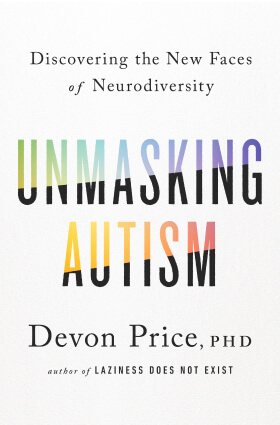
Masked Autism: What Happens When You Pass as Neurotypical?

Masked Autism: What Happens When You
Pass as Neurotypical?

Social psychologist Devon Price, PhD, was diagnosed with autism in his late 20s. “I knew nothing about autism other than the narrowest stereotypes of a nonverbal kid who wasn’t treated with much dignity or respect,” Price says. “There’s a huge population of stealthy autistic people who are marginalized and never realize that they have a disability until well into adulthood.”
-
It wasn’t until a family vacation with his autistic cousin that Price realized he’d been concealing his atypical neurological and social tendencies out of fear of judgment and exclusion.
In his new book, Unmasking Autism: Discovering the New Faces of Neurodiversity, Price explains, through scientific research and personal experience, the many aspects of masked autism and its adverse effects on mental health. His work is changing the perception and reality of what the neurodiverse world looks like.
-
Devon Price
Unmasking Autism: Discovering the New Faces of Neurodiversity
Bookshop, $25SHOP NOW
A Q&A with Devon Price, PhD
Autism is a developmental disability. Autistic brains process the world in a very bottom-up fashion and don’t filter reflexively. Our brains are constantly processing everything independently. Rather than seeing the forest, we see every individual tree. It’s why we have sensory issues. It’s why we’re not as instinctive at reading people’s facial expressions. We have to piece together what we think someone is feeling based on every little movement of their face instead of just knowing if they are sad or angry.
Masked autism is when we attempt to camouflage ourselves to fake being neurotypical. Some people who do this do not know that they have autism and have not been diagnosed. Some common experiences for masked people are: Faking a personality everywhere you go and hiding from other people how sensitive you are to sensory information—bright lights, loud sounds, strong fragrances, strong flavors. Finding eye contact painful but forcing yourself to do it anyway. Being a social chameleon—if you conform to whatever people around you are doing, because you know that if you behave naturally, people will treat you like a freak. Some of us mask by becoming inhibited or shy and never speaking our mind because we know that people will take it the wrong way. Some people mask autism by being a social butterfly who can seemingly get along with anyone because they’re good at people-pleasing and imitating.
One of the reasons that a lot of autistic people are stereotyped as not being social or being super introverted is that we find it so exhausting to be around people. We’re suppressing who we are all the time and pouring a lot of energy into faking enthusiasm or stifling things we are passionate about. It alienates you from your body as well. There’s a strong correlation between masking and depression, anxiety, and identity loss. The most troubling thing is that masking is associated with a much higher risk of suicide for autistic people. A lot of people want to escape that deep existential alienation.
One of the exercises is designed by autistic coach Heather Morgan, and it’s called the values-based integration exercise. It’s an awesome exercise for getting in touch with your authenticity and something I would encourage nonautistic people to do, too. What you do is basically sit down and think of five key moments across a variety of different ages and times in your life when you felt fully excited and happy to be alive.
Then you identify what made those moments so special. What were the circumstances that made you feel so free, happy, and real? What did those moments reveal about what you really value and believe in?
For example, one of those peak moments might be a vacation with someone you feel close to, and you were fully present in the moment and not worrying about work or school—just appreciating being with someone you cared about. That might reveal that you value connection, mindfulness, and being physically present in nature.
From there, you contemplate what you can do to set the conditions so that you can be that person more often.
The best thing you can do is to believe us. If you’re not autistic, question any knee-jerk reactions you might have to the autistic person, like when you think they’re being cold, rude, or oblivious. That’s something that a lot of us run into time and time again. It’s a big reason that a lot of us mask our autism and become closed off from other people. We misread a lot of social cues and tend to be very literal and straightforward. Unfortunately, a lot of people get offended by that and interpret it as malicious.
We get scared to share who we really are with people because of that backlash. So often we’re just communicating on completely different wavelengths. Just be patient and approach us with a spirit of good faith. Trying to reexplain something if it seems like we missed it can make a world of difference. Getting treated with that kind of patience is healing for an autistic person and makes it possible to open up to people again.
To this day, all the diagnostic assessments for autism are ones that were designed for kids, specifically White boys. So adults in their 30s or 40s who go to get assessed are given an assessment where they sit down with a children’s picture book and are asked to tell a story about what they see in that book. It’s an assessment that was designed for someone three or four years old. These diagnostic tools that most psychiatrists use to this day were not built for the full diversity of autistic people and how autism can look. Anyone who doesn’t meet the stereotype of what autism looks like in that population can wind up falling through the cracks, like trans people, women, people of color, and people in poverty.
Psychiatric professionals and psychologists need to get educated on what autism is. We need to teach educators earlier in their training about various disabilities—including autism, ADHD, and sister conditions.
We also need to create sensory-friendly spaces and push for them legally under the Americans with Disabilities Act. Making public spaces, workplaces, and schools comfortable on a sensory level for autistic people or people with other sensory issues is a start. Keeping work from home as an option is essential for disability justice, not just for people with autism but for caretakers and people with physical disabilities or chronic illnesses. A huge segment of the population benefits from being able to set their own schedule and control their environment in that way.
Over 50 percent of all people shot by the police have a disability, and usually it is a disability such as autism or a mental illness. Black people with autism, who may avoid eye contact, are often misread as defiant or unsafe by White people rather than autistic and overwhelmed. We need to abolish those systems and reexamine how we treat people of color in this country with violence. It takes a massive toll on autistic people of color.
Devon Price, PhD (he, him, his), lives in Chicago and is a social psychologist and assistant professor at Loyola University of Chicago’s School of Continuing and Professional Studies. He is the author of Laziness Does Not Exist and Unmasking Autism: Discovering the New Faces of Neurodiversity. Price’s research has appeared in journals such as the Journal of Experimental Social Psychology, Personality and Social Psychology Bulletin, and The Journal of Positive Psychology.
This article is for informational purposes only, even if and regardless of whether it features the advice of physicians and medical practitioners. This article is not, nor is it intended to be, a substitute for professional medical advice, diagnosis, or treatment and should never be relied upon for specific medical advice. The views expressed in this article are the views of the expert and do not necessarily represent the views of goop.
We hope you enjoy the books recommended here. Our goal is to suggest only things we love and think you might, as well. We also like transparency, so, full disclosure: We may collect a share of sales or other compensation if you purchase through the external links on this page.


